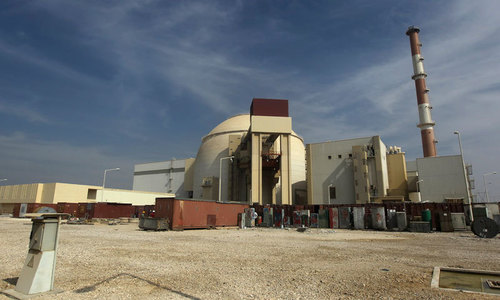DUBAI: The outgoing chief of Israel’s Mossad intelligence service has offered the closest acknowledgment yet his country was behind recent attacks targeting Iran’s nuclear programme and a military scientist.
The comments by Yossi Cohen, speaking to investigative programme Uvda of Israel’s Channel 12 in a segment aired on Thursday night, offered an extraordinary debriefing by the head of the typically secretive agency in what appears to be the final days of Prime Minister Benjamin Netanyahu’s rule.
It also gave a clear warning to other scientists in Iran’s nuclear programme that they too could become targets for assassination even as diplomats in Vienna try to negotiate terms to try to salvage Tehran’s atomic accord with world powers.
“If the scientist is willing to change career and will not hurt us anymore, then yes, sometimes we offer them” a way out, Cohen said.
Among the major attacks to target Iran, none have struck deeper than two explosions over the last year at its Natanz nuclear facility. There, centrifuges enrich uranium from an underground hall designed to protect them from air strikes.
In July 2020, a mysterious explosion tore apart Natanz’s advanced centrifuge assembly, which Iran later blamed on Israel. Then in April of this year, another blast tore apart one of its underground enrichment halls.
Discussing Natanz, the interviewer asked Cohen where he’d take them if they could travel there, he said “to the cellar” where the centrifuges used to spin. “It doesn’t look like it used to look,” he added.
Cohen did not directly claim the attacks, but his specificity offered the closest acknowledgement yet of an Israeli hand in the attacks. The interviewer, journalist Ilana Dayan, also seemingly offered a detailed description in a voiceover of how Israel snuck the explosives into Natanz’s underground halls.
The man who was responsible for these explosions, it became clear, made sure to supply to the Iranians the marble foundation on which the centrifuges were placed, Dayan said. “As they install this foundation within the Natanz facility, they have no idea that it already includes an enormous amount of explosives.”
They also discussed the November killing of Mohsen Fakhrizadeh, an Iranian scientist who began Tehran’s military nuclear programme decades ago. The US intelligence agencies and the International Atomic Energy Agency believe Iran abandoned that organised effort at seeking a nuclear weapon in 2003. Iran long has maintained its programme is peaceful.
While Cohen on camera didn’t claim the killing, Dayan in the segment described Cohen as having “personally signed off on the entire campaign”. Dayan also described how a remotely operated machinegun fixed to a pickup truck killed Fakhrizadeh and later self-destructed.
Published in Dawn, June 12th, 2021














































